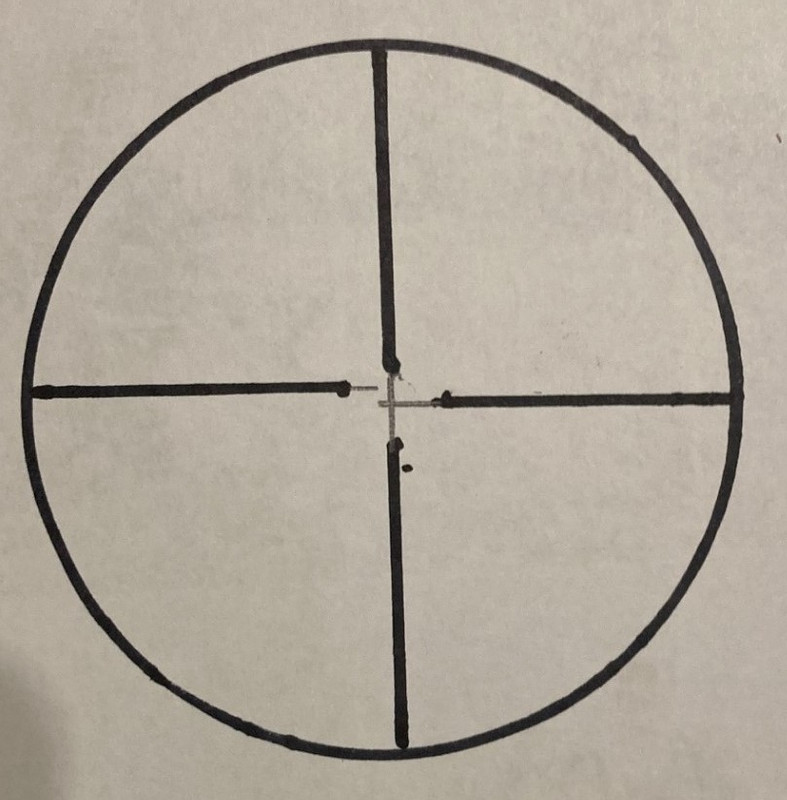09 January 2025, 18:25
StonecreekWierd Defective Reticle
I picked up a original Denver Redfield scope, 2-7X, on a rifle I bought recently. I didn't count the scope as being worth much monetarily, so wasn't too upset when I found that it had an unusual defect in the duplex-type reticle.

I've drawn a picture of it since I found it impossible to properly photograph the reticle itself. The LH side of the reticle is offset and just slightly higher than the opposing side -- in other words, they don't meet in the middle.
I would have assumed that the Redfield used a reticle etched on a lens unlike early scopes which actually used a thin wire, or even a spider web. Can anyone explain this?

09 January 2025, 20:04
SaeedThis is defective.
Built in bullet drop compensation and wind drift!

10 January 2025, 06:51
sambarman338Sorry Stonecreek but I can't see the image.
I can say that the scope is definitely image-movement, as Redfield never made any until they took over the new design from Kollmorgen.
One of their early ones had the reticle in the first focal plane on the front of the erector tube but they soon changed to the second plane and this was the key to the non-magnifying reticles in their variables. Even then, they put the reticle in the erector tube, claiming this kept it aligned with the erector-set lenses (too bad about alignment with the ocular and objective lenses, when the scope was mounted crookedly). Weaver, on the other hand, claimed his reticle was superior because it was fixed solid in the outer tube.
I have not heard that Redfield used a graticule lens.
10 January 2025, 18:45
StonecreekNot sure what happened to my image but I've reposted it.
11 January 2025, 02:27
sambarman338By the drawing, it looks as though the the wire has just broken and, without tension, moved out of alignment.
11 January 2025, 18:10
StonecreekBut is it a wire? I was under the impression that the reticle was etched on a lens.
And if it were a broken wire would it remain so straight? Years ago I came across a cheap Asian-made scope on which the wire broke. It "slumped" over sideways. I would think if the reticle were a wire that it couldn't stay straight and so securely in place if broken.
12 January 2025, 05:50
sambarman338Good point, Stone creek. I can say that the old German #1 reticles were mostly just brass leaves that did not meet in the middle, and yet held well enough
Most of the time.Having the outer, duplex bars, yours would have a modicum of that stiffness, I think.
Maybe the previous owner stopped using it as soon as the wire snapped; continued use on a centrefire might well pull it forward, out of focus.
15 February 2025, 02:15
AtkinsonI've seen that or similar breaks in various scopes usually the result of below zero weather causing the breaks, mostly in Weaver K scopes as I recall..
02 April 2025, 20:40
Doglegquote:
Originally posted by Stonecreek:
But is it a wire? I was under the impression that the reticle was etched on a lens.
And if it were a broken wire would it remain so straight? Years ago I came across a cheap Asian-made scope on which the wire broke. It "slumped" over sideways. I would think if the reticle were a wire that it couldn't stay straight and so securely in place if broken.
There's a lot of scopes that use wires; although wire might not be the best word in all cases. Some are more like foil. If you go back far enough in time actual hair was a thing, and spider webs got used a bit. Etched reticles have been around for a long time, the oldest I had was a tapered crosshair on a non adjustable B&L Bal-Var from the 60s.

